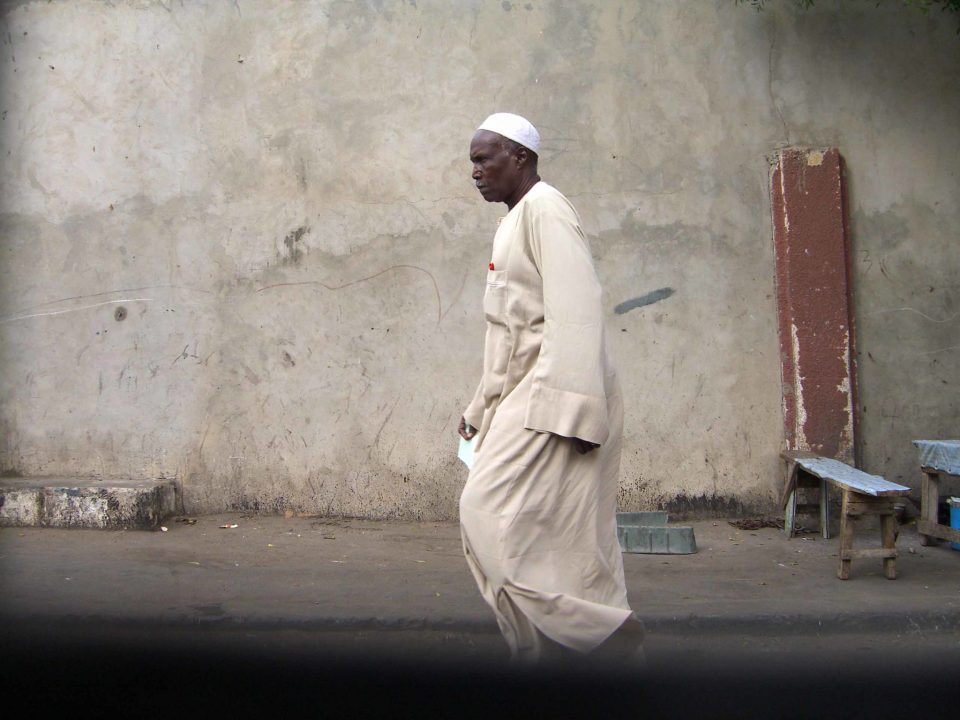Taken on the street (from a taxi) in Dakar, Senegal. Image credit Angela Sevin via Flickr CC BY-NC 2.0.
Africa Is A country, January 12, 2022
Warsan Magazine, January 28, 2022
Islamic scholarship in Africa and the meaning and end of decolonization in the work of religious studies scholar, Ousmane Kane.
Alongside recent monographs, edited volumes, and translations Islamic scholarship in Africa explores a robust and active field. It is a work that is current, forward-looking, engaged with global issues and directed to a general audience. The bibliography is broad and the glossary of terms are of benefit to the non-specialist. Given that the individual essays in this volume reflect many distinct research agendas, sites, and objects of inquiry, I will not attempt to summarize their contents. Instead, I focus on the broader issue of the decolonization of knowledge flagged for the reader’s attention in both Kane’s introduction and the conclusion by the former executive secretary of CODESRIA, Ebrima Sall.
Questions of decolonization
Sall situates the volume, along with the broader proliferation of academic works on the topic, within CODESRIA’s now decades-long project to bridge knowledge divides within Africa. These divisions are defined by differences in research language, intellectual training, and presumed racial identity. In particular, Kane’s research agenda to recognize the intellectual contributions of Muslim African scholars actualized many of the Pan-African principles of the organization. His Non-Europhone Intellectuals, published as a CODESRIA working paper in 2003, set forth the terms for a new field that would eventually come to be known as Timbuktu Studies. This field has solicited interest and support from international foundations, African governments, and a global network of university-based researchers.
We might ask, however, how does this interest in Islamic scholarship sit in relation to African studies more broadly? The objections that followed Kane’s keynote in 2018 highlight some common resistance to this work. The responses from the floor, as I recall them, were somewhat predictable. Some asserted that Islam was not modern. Others found that the neglect of African traditional religions by Kane was an inexcusable lapse. For them, if social science is to take religion seriously in Africa, it should be truly African religions upon which they must focus their seriousness. Islam and Christianity, they argued were either copies of originally African ideas or antagonistic to what was authentically African. “African” for them, it seems, meant autochthony. It meant differences from other geo-racial types and their specific religiosities that are ultimately products of colonization. These objections were predictable because they form opposing positions, based as much on epistemic commitments as points of view that frame the problem of religion in Africa. Kane and others have responded to such ideas exhaustively.
For example, Islam, from its origins, has been African, from the first hijra, or exodus, to Abyssinia through to the very rapid spread to Fustat, or what is now Cairo, and then with the history of the mostly peaceful and gradual spread of Islam in West Africa. And yet, the idea of Islam’s coloniality, if we can stretch the term so thin, persists. Much like the ideas about primordial African orality, they form discursive structures that seem impervious to empirical invalidation. It is indeed an old idea that West African Muslim scholars have been refuting since at least the 17th century Timbuktu scholar Ahmed Baba, and echoed in the 20th century by Senegalese polymath Shaykh Musa Kamara. Perhaps, that is a good thing for the future of the field.
All of this being said, one wonders beyond the scope of Islamic Scholarship in Africa, how might Timbuktu Studies deal with some of the thornier issues that have emerged in the long history of developing an epistemological alternative. Specifically, I am thinking here of the field’s relation to the older project of the Africanization of knowledge, which sought to consider Africa in indigenously African terms and the Islamization of knowledge/Islamic social sciences, which sought to establish modern social scientific method on Islamic foundations. Is the study of Islamic scholarship in Africa simply a continuation, an evolution of these two separate projects, or does their convergence make a qualitative leap that makes it distinct and uniquely promising? There might also be a generative encounter between Timbuktu Studies with Critical Muslim Studies such as that coming out of South Africa, emanating as it does from post-Rhodes debates on decoloniality.
Decolonization has become a big tent, a broad term enveloping many meanings, a concept that approaches protean status. Much like “religion” and “modernity” it bears different significations that correspond to conflicting epistemological, disciplinary, and political commitments—each one ultimately seeking different objectives. For a radical, anti-historical but utopian decolonial project, Islamic Scholarship in Africa might not satisfy the performance of rupture. However, this volume is vital if one is willing to agree with Sall and Kane, as I do, that African epistemic self-affirmation is the ultimate end of decolonization.
About the Author
Wendell Marsh is an assistant professor of African American and African Studies at Rutgers University-Newark. He is a post-disciplinary scholar of Islam in Africa, textuality, and the theory and practice of African Studies.

